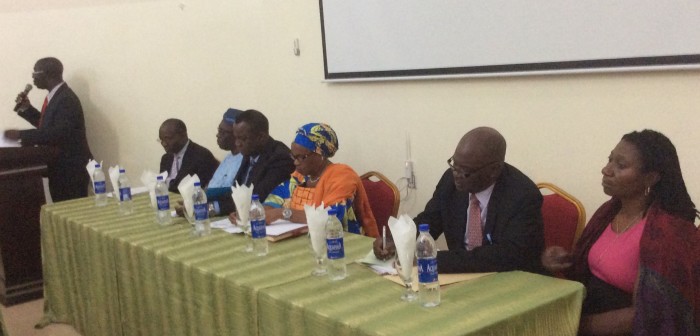As the much-vaunted 21st Session of the Conference of the Parties (COP 21) to the United Nations Framework Convention on Climate Change (UNFCCC) approaches, Nigeria has commenced moves to ensure a befitting participation at the global summit.

Towards this, the nation is establishing a group of national multi-sectoral experts that will support is negotiations at COP 21 in Paris, France, where about 196 countries will sign a new climate change agreement.
At a climate change training workshop that held in Abuja from Monday to Tuesday, the organisers – Federal Ministry of Environment (FME) and United Nations Development Programme (UNDP) – sought to build the capacity of a gender-balanced core group of national negotiators representing the academia, government, private sector players, civil society and the media.
Dr. Pa Lamin Beyai, Country Director of the UNDP, expressed hope that the forum would, in broader terms, increase the awareness of the strong linkages between climate change and sustainable development policies in Nigeria.
He said that it would foster deeper dialogue and cooperation across a network of national and sub-national technical experts and leaders in the field of international relations, economic development, forestry, natural resources management, green economy, national development and financial planning.
Similarly, he emphasised that the training would provide an enduring platform for national discussions that will in turn define Nigeria’s position and contribution to the COP 21 in Paris.
He said: “We all know that the current emissions on the greenhouse gas runs out in 2020. But, after that, what happens for the decade after that and beyond? That is the big question we need to ask ourselves.
“For us here, we would like to see Nigeria and along with other African countries develop a common position to address climate change challenges and its adverse effects on her population’s livelihood. We need to develop a strong legal framework, with clear rules, a central role for equity and with very strong linkage to the 2015 Sustainable Development Goals. Hopefully, with these elements in the new deal, we are well on our way towards tackling the impacts of climate change on the continent.”
According to him, the programme is aimed at increasing Nigeria’s presence and influence on international politics, notably within the UNFCCC framework, in a way that actively contributes to building the key conditions for successful mitigation and adaptation in the country.
“As you are all aware, a strong deal will not only help Nigeria meet her international obligations, eliminate poverty, improve health and the living standards of the people, make agriculture a flourishing sector, but that it would also help increase investment opportunities, especially in clean and renewable energy solutions, and as well as develop the much needed human and institutional capacities to undergird these progress,” Dr Beyai stated.
Permanent Secretary in the FME, Mrs Nana Fatima Mede, stressed that not only does Nigeria need to strengthen the capacity of her experts already engaged in the process, but her negotiators needed to be well grounded in the emerging issues of the Convention, its processes, intricacies and the required skills of deliberations and negotiations.
Her words: “The Nigeria current position in the context of the UNFCCC negotiation and along that of the Africa Group suggests a scheme based on equitable multilateral rules with a strong link to fair access to sustainable financing.
“Nigeria wishes to see a global objective for adaptation and a mitigation objective in the 2015 agreement to limit global warming to below 20C compared with pre-industrial levels. The Africa Group proposes the use of a reference framework to reflect mitigation actions and adaptation measures taken by the countries that would lead to equity.
“We will therefore continue to stress in our negotiation the necessity for the developed country Parties in the climate change process to come forward with ambitious scale of emission reduction both in the pre- and post-2020 Agreement.”
She added that the training workshop would enhance the technical capacity of Nigeria in the development of actions that allow the mainstreaming of climate change into national and sectoral development goals by continuing the institutional and technical capacity strengthening process.
Mrs. Mede officially launched the National Policy on Climate Change document which, according to her, the FME developed “to act as a guide in the national implementation on climate change activities. The implementation is cross-cutting in that it involves all sectors.”
